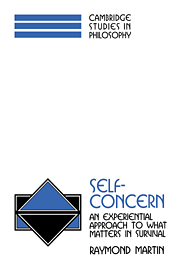3 - Rejuvenation
Published online by Cambridge University Press: 26 March 2010
Summary
I want now to introduce a kind of fission example that I claim is invulnerable to recent neoconservative attempts to show that identity really is what matters in survival. I shall use the example to support two ideas: first, that for many people identity is not what matters primarily; and, second, that for those same people there is no reason to think that identity should be what matters primarily. In arguing for these ideas I shall assume that the question of what matters in survival is best approached from a thoroughly naturalistic perspective, hence, that personal identity is not best explained by appeal to spiritual substances, to immaterial souls, to any sort of supposedly essentially indivisible entity, and so on. All of the neoconservatives whose views I am going to consider would grant such assumptions.
THE EXAMPLE: FISSION REJUVENATION
John is twenty years old. Physically and psychologically he is in very good shape. He is handsome, healthy, and vital. He knows that even without undergoing fission rejuvenation his prospects are good for a long and happy life. He also knows that he will never be in better physical condition, never better positioned, to undergo the procedure. He worries that already he may have waited too long.
In the morning John will go to the hospital, where he will be put under a general anesthetic and then have his brain divided into functionally equivalent halves, each capable of sustaining his full psychology.
- Type
- Chapter
- Information
- Self-ConcernAn Experiential Approach to What Matters in Survival, pp. 53 - 72Publisher: Cambridge University PressPrint publication year: 1997



